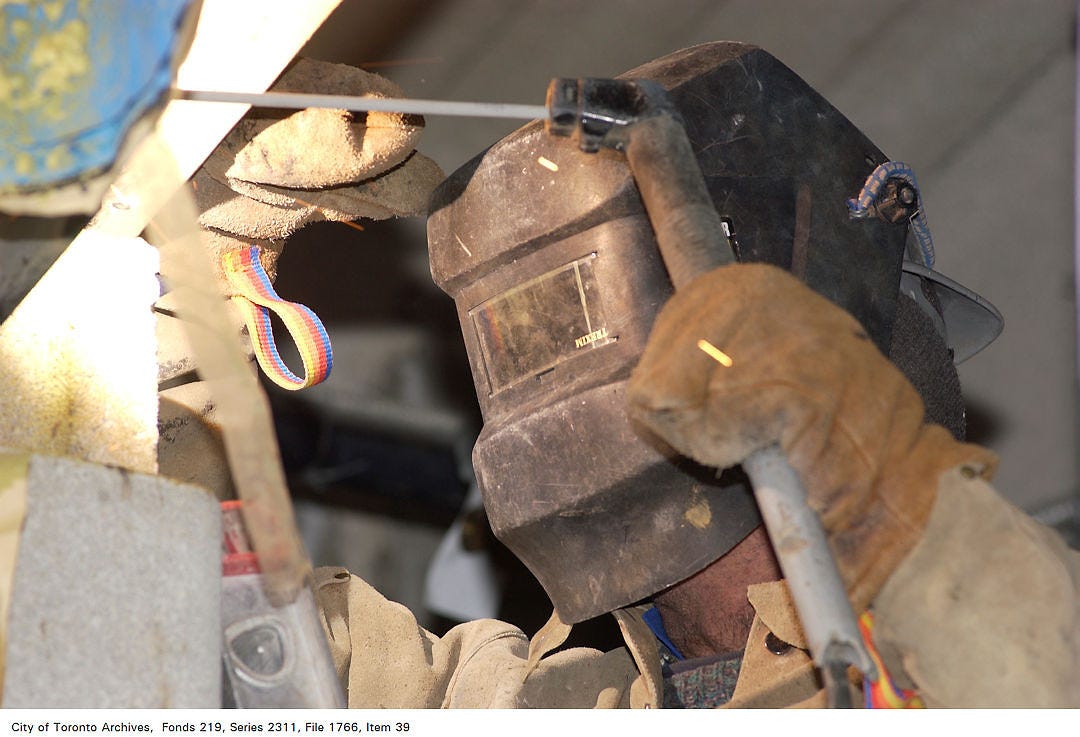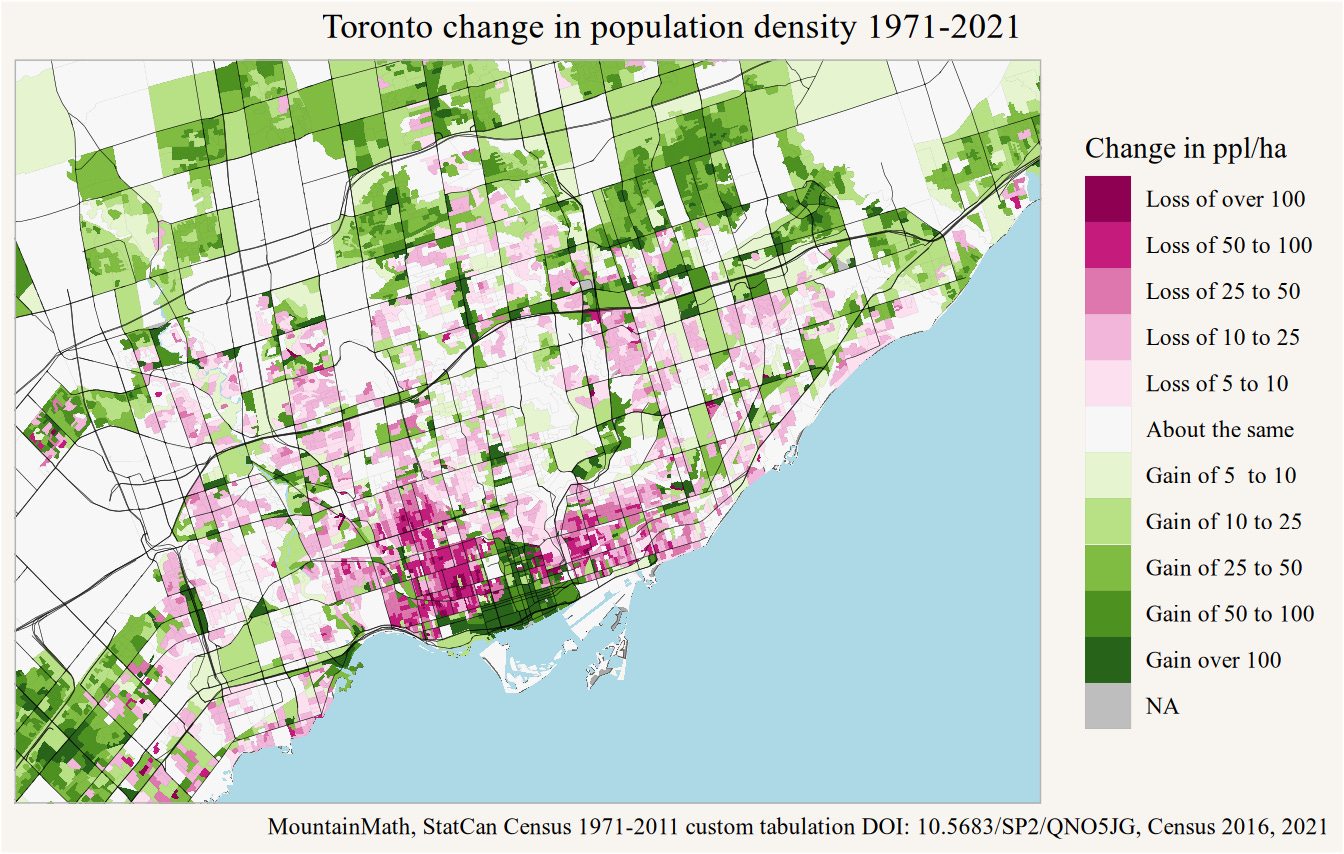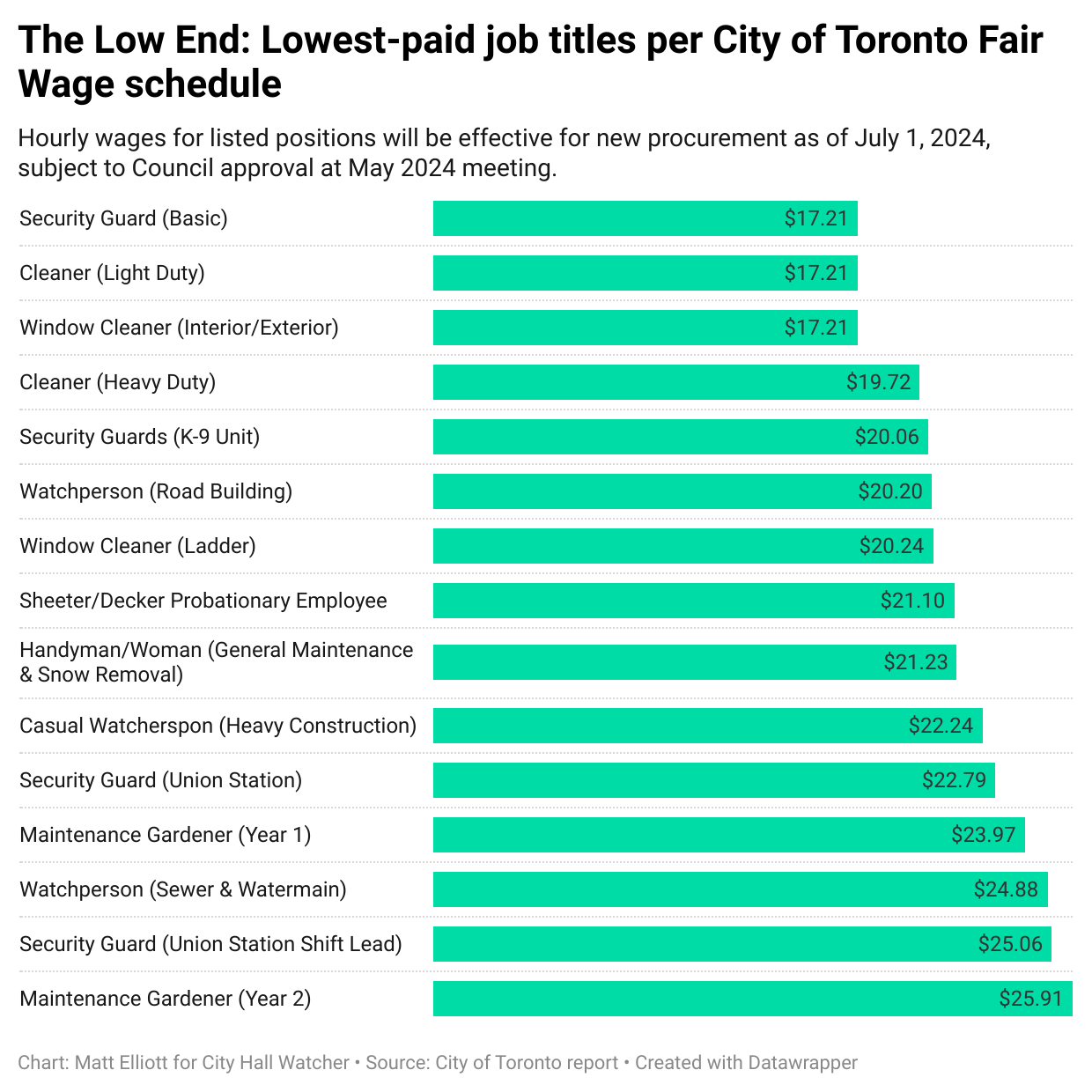Paying a minimum for maximum security
City Hall Watcher #280: Charts of the highest-paid and lowest-paid hourly gigs for the City, a special look at security guard spending and a round-up of news ahead of this week's Council meeting
Hey there! Welcome to the 280th issue of City Hall Watcher. As is our custom around these parts, because this issue has a number that ends in zero, it’s being sent free to the full list of City Hall Watcher subscribers, including those who haven’t paid for a subscription.
If you dig it, I’d love it if you could consider joining the paying subscriber club. Despite inflation, global economic uncertainty, and the increasing amount I am now spending to buy Kinder chocolate eggs for my toddler, the price remains just six bucks a month plus HST. It’s a bargain and a deal.
Subscribing will get you access to a bunch of exciting upcoming subscriber-exclusive issues, including:
The spring update to the COUNCIL SCORECARD, looking at how voting alliances are shaping up to support (and oppose) Mayor Olivia Chow as she approaches the anniversary of her election.
A brand new LOBBYIST WATCH, looking at all the lobbying activity in May.
The first COUNCIL POWER RANKINGS of the Chow era, ranking the movers and shakers by the amount they’re moving and/or shaking on the issues that matter.
In the summer, we’ll also be bringing you more contributions from other writers. (Speaking of: if you have a pitch, now is a really great time to get in touch.)
You also get instant access to subscriber-exclusive archives, including recent issues covering topics like:
City Hall’s biggest road warriors! Which member of Council drives the most, according to expense records?
A look at City Hall’s fleet of vehicles, showing that despite their climate change efforts a lot of divisions still have a real prediliction for big trucks.
A GPT-aided look at City procurement, showing that a whole lot of contracts are awarded through a process that only attracts one or two bidders.
For this week’s issue, I’ve dug into an item on Council’s agenda setting out a new wage schedule for City Hall’s Fair Wage Policy. I was curious to generate a list of the highest- and lowest-paid hourly wages for municipal work. The journey of discovery led me to tally up how much the City has spent on security guards this term. It’s a lot.
Let’s dive in.
— Matt Elliott
graphicmatt@gmail.com / CityHallWatcher.com
Read on the web / Archives / Subscribe
Gig work: what kind of jobs does City Hall value the most?

I covered the big items on this week’s Council meeting agenda in Friday’s bonus issue, but I thought another item was worth noting, even though it’s likely to get passed without debate.
City Council will consider an update to its longstanding Fair Wage Policy. Dating back to 1893, the policy dictates that contractors doing business with City Hall pay their workers at rates roughly equivalent to union rates—or, for non-union gigs, comparable to the prevailing private-sector rates.
The wage schedule is supposed to be updated every three years, but City Hall fell a bit behind during the pandemic. The new rates technically take effect retroactive to January 1, 2024, but because of the delay they won’t start applying to new contracts issued by the City until July 1, 2024. (Assuming, of course, that Council approves this item.)
The item includes several attachments listing the new minimum hourly wages for a bunch of common jobs needed to carry out City contracts. And because I’m a sucker for giant lists of numbers, I had little choice but to chart out the highest-paid and lowest-paid jobs under the new schedule.
Let’s start with the highest.
There are many commonalities at the top of the list. Welders do very well, especially if they bring their own equipment for tunnel work. The highest-earning hourly wage here translates to an annual salary of about $150,000.
Elevator mechanics are also well-paid. There’s been a shortage of qualified workers to fix elevators at the same time the city has seen the installation of a whole lot of elevators, so that checks out.
Crane operators who work high in the sky also earn high salaries, befitting their perch.
The other end of the Fair Wage Schedule is arguably more interesting.
There are serious commonalities here, too: security guards, cleaners, and gardeners are generally some of the lowest-paid workers doing City-commissioned work.
For the lowest-paid security guards and cleaners—making $17.21 an hour—that translates to a full-time annual salary of about $36,000. Finding housing within the City while making that kind of money is virtually impossible.
City Hall has been spending high on low-wage security guards
Seeing security guards on the low-paid list got my attention because I’ve been seeing a heck of a lot of contract awards for security guard services roll through the Bid Award Panel and General Government Committee lately.
Some quick math reveals that City Hall has awarded $48.8 million to security guard firms so far this term. If you include option years in the various contracts, the total could reach as high as $107.8 million. Much of it is going to provide security for shelters. The two biggest vendors are West Egg Group and ASP Incorporated. (The good news is there’s generally real competition for these security contracts, which is not something you can say a lot of other City Hall procurement.)
I’m not quite sure what to make of all this.
I understand there’s an important distinction between a police officer and a security guard, but it still feels like there’s a lot of duplication in City Hall funding both a billion-dollar police force and a growing cadre of what some might term rent-a-cops.
Throw in that these security guards are some of the lowest-paid workers doing municipal work while cops take up several spots on the top of the City’s sunshine list, and, well, it really feels like something that’s worth keeping an eye on. Let’s observe and report.
In other news
If you missed it last month, it’s worth going back and reading a CBC investigation into the cost of paying suspended police officers to sit at home. The province-wide cost is estimated at $134 million over the last 11 years. Suspended officers in Toronto have already cost $1.3 million so far this year. Across all the data, the most common reason for suspension is gender-based violence. Most officers convicted of a crime still return to work — less than 10% are fired. Just incredible data journalism from the CBC’s Julie Ireton and Valerie Ouellet.

Jens von Bergmann has published a fascinating map showing changes in Toronto’s population density from the 1970s through 2021. It seems relevant to this week’s debate about allowing more density on major streets city-wide.
“‘Next time you see a police officer parked on or near the Sherbourne bike lane, please do what I do: thank him or her for his service,’ wrote the officer for 51 Division, whose name the Star is withholding at the request of the cyclist.” There is some jaw-dropping stuff in this story by the Star’s Emily Fagan about a complaint regarding police officers parking in bike lanes.
I was just one of the many people who talked to Desmond Cole about the mayor, Council and the role of community advocacy groups for a story he published in The Grind. “The emergence of a more progressive agenda doesn’t hinge on our mayor’s presumed compassion, or on the youngest and most diverse Council in memory. Instead, it is forming and faltering and taking shape within self-organized groups of people who are surviving the city’s neglect,” Cole writes, in an insightful piece.
With a Council meeting this week, it’s a great time to go back and look at the great feature by the Star’s David Rider, Ben Spurr and Alyshah Hasham about the various roles emerging on Council under Chow. There’s the stickler, the enigma, the jester, the veteran, the expert, the critic, the diplomat, the dissenter and the rookies. Quite the crew.
More from Matt: on worrying about Bike Share’s growing pains, and chilling out about six-storey buildings
📰 For the Toronto Star last week, I wrote about the Bike Share. It’s growing fast, and with that comes what the agency calls “growing pains.”
A budget battle between the City and the Toronto Parking Authority hasn’t helped matters. But I’m now told there’s some good news on the horizon. I’ll be paying close attention to the next TPA Board agenda.
📰 For the Star this week, I write more about one of the headline items on tomorrow’s Council meeting agenda: a proposal to allow six-storey buildings and townhouses on major streets city-wide. Some councillors are likely getting ready to argue against it. I’m suggesting they should chill out a bit.
The week at Toronto City Hall
City Hall Watcher #280
Thanks so much for reading. And a special thanks to those paying subscribers who have supported this newsletter through 280 issues. Onward to number 300. Hey, anyone know any good artists who can draw a comic book-style cover?




